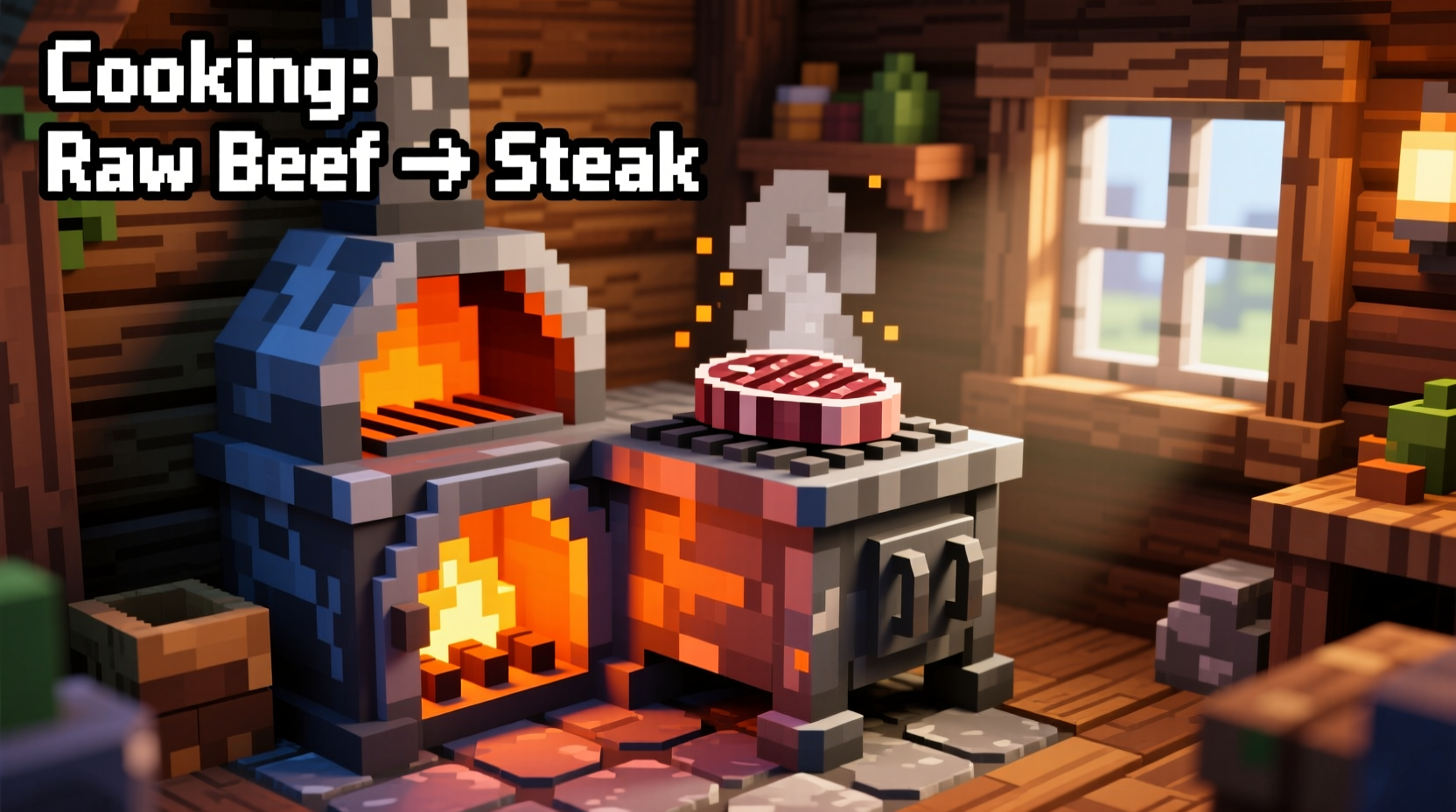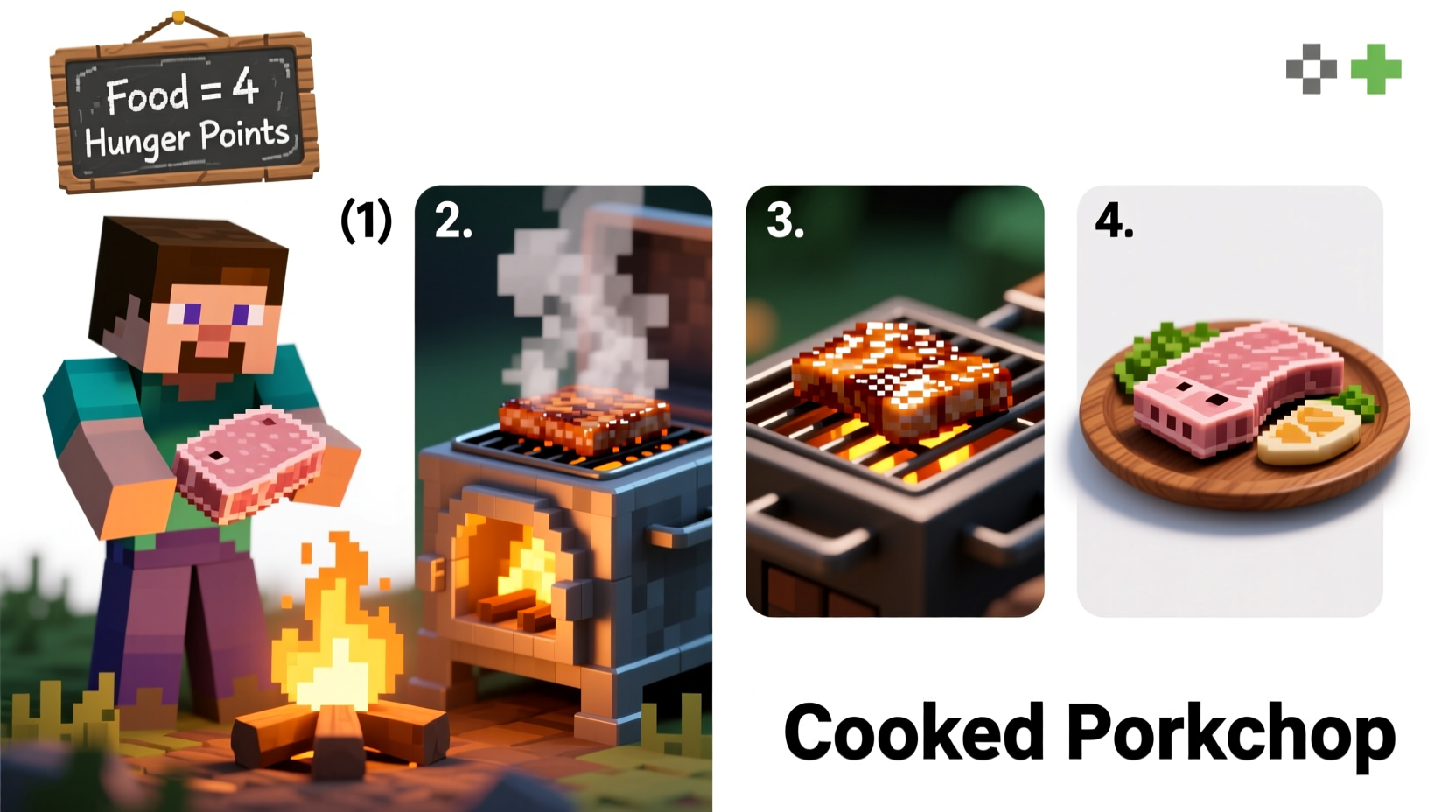Why Cooking Matters in Your Minecraft Survival Strategy
Understanding Minecraft's cooking mechanics isn't just about making food—it's a strategic advantage. Cooked food provides significantly higher saturation and hunger restoration compared to raw alternatives. A single cooked porkchop restores 8 hunger points with 12.8 saturation, while raw pork only gives 3 hunger points and 1.8 saturation. This difference determines whether you can survive extended mining expeditions or succumb to zombie attacks when your hunger bar drops.
Recent game updates have expanded cooking options beyond basic furnaces. The 1.14 Village & Pillage update introduced smokers specifically optimized for food preparation, cooking items 50% faster than regular furnaces. Meanwhile, campfires added in the same update allow for open-flame cooking without fuel management concerns, though at a slower pace.
Your Step-by-Step Cooking Setup Process
Follow this proven sequence to establish efficient food preparation:
1. Gather Essential Materials
You'll need:
- 8 cobblestone (for furnace construction)
- Raw food items (meats, potatoes)
- Fuel source (coal, wood, bamboo)
- Wooden pickaxe (minimum stone tier required)
2. Construct Your First Furnace
Open your crafting grid and place cobblestone in all slots except the center. This creates a furnace that functions as both cooking apparatus and fuel smelter. Place it near your food storage for workflow efficiency.
3. Optimize Fuel Selection
Not all fuels perform equally. This comparison shows cooking capacity per fuel item:
| Fuel Type | Items Smelted | Best For |
|---|---|---|
| Lava Bucket | 100 | Long-term automated setups |
| Coal/Charcoal | 8 | General purpose cooking |
| Bamboo | 3.75 | Jungle biome expeditions |
| Wood Planks | 1.5 | Emergency situations |
Advanced Cooking Methods for Seasoned Players
Once you've mastered basic furnace operation, consider these specialized techniques:
Smoker Efficiency for Food Processing
Craft a smoker using a furnace surrounded by four wood logs. This specialized block processes food twice as fast as regular furnaces, making it ideal when you've just returned from a successful hunt and need quick nourishment. The cooking animation completes in 10 seconds versus 20 seconds in standard furnaces.
Campfire Cooking for Mobile Survival
When exploring distant biomes without established bases, craft a campfire (3 sticks, 1 charcoal, 3 wood). This portable solution cooks food without fuel consumption, though at 30 seconds per item. Position it inside temporary shelters for safe nighttime cooking during expeditions.
Strategic Food Choices: What to Cook First
Not all cooked foods provide equal benefits. Prioritize these high-value items:
- Cooked Mutton: Restores 6 hunger points with 9.6 saturation—excellent for early-game survival
- Cooked Salmon: Provides 5 hunger points with 6 saturation, plus water breathing effect in specific game versions
- Baked Potatoes: Transforms risky raw potatoes (25% chance of poisoning) into safe food restoring 5 hunger points
Avoid wasting resources cooking spider eyes or rotten flesh—these remain harmful even when cooked. Remember that cooking doesn't affect food's secondary effects; golden carrots maintain their superior saturation bonus whether raw or cooked.

Troubleshooting Common Cooking Issues
When your furnace isn't working as expected, check these frequent problems:
- No ignition: Verify you've placed fuel in the bottom slot, not the input slot
- Slow processing: Smokers only speed food preparation—use regular furnaces for ores
- Items disappearing: Accidentally placing fuel in output slot causes instant consumption
- Insufficient fuel: Switch to lava buckets for extended cooking sessions
Automating Your Food Production
For permanent bases, create automated cooking systems using:
- Hopper chains feeding multiple furnaces
- Comparator outputs monitoring fuel levels
- Dispensers for automatic item collection
- Redstone clocks for continuous operation
These setups require significant initial investment but pay dividends when managing large-scale food production for multiplayer servers or extensive exploration projects. A properly configured 9-furnace array with lava bucket fuel can process an entire cow's worth of beef in under two minutes.
Version-Specific Cooking Mechanics
Minecraft's cooking system has evolved significantly since the game's inception. Understanding these changes helps when playing across different versions:
- Pre-1.3: No furnaces—food could only be eaten raw
- 1.3-1.13: Basic furnace mechanics established
- 1.14: Smokers and campfires introduced
- 1.16: Blast furnaces gained food-cooking capability
- 1.20: Cooking animations updated for better visual feedback
When joining multiplayer servers, confirm which version's mechanics apply—some servers use custom plugins that modify cooking speeds or nutritional values.











 浙公网安备
33010002000092号
浙公网安备
33010002000092号 浙B2-20120091-4
浙B2-20120091-4